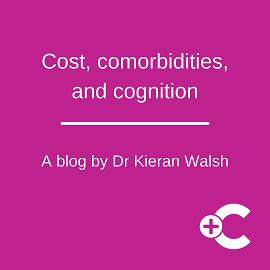Cost, comorbidities, and cognition

Dr Kieran Walsh
Comorbidities are important to patients, professionals and healthcare providers. This is fundamentally because of the impact that comorbidities have on quality of life. They can cause a range of symptoms, distress and inconvenience to patients. However, comorbidities are also associated with increased costs. In hospital care, this can be related to prolonged length of stay, more frequent readmissions, and more intensive interventions. But there is a lack of research on which comorbidities are most likely to result in increased costs and the relative role of impaired cognition in patients in contributing to increased costs.
The recent study by Bail et al attempts to answer some of these questions. (1) It uses a retrospective cohort design to examine cognition, comorbidities and complications in predicting excess cost for older inpatients with clinical complexity. The authors found that dementia was a key predictor of excess cost as were hospital-acquired complications. This is an important finding and could have practice-changing implications for healthcare providers – so it is worth looking in detail at how the study was done. It was a retrospective study and so relies on administrative data – which is inevitably variable in quality. It looks at dementia as a whole and not at various subtypes such as Alzheimer’s disease or vascular dementia. The study was conducted in New South Wales in Australia and so is likely to be relevant to other regions of the world with similar types of patients and similar types of health systems. The study looked at multiple outcomes but did not look at the functional capacity of patients.
Despite this, the study is important and has practical implications for clinical practice. Patients with dementia could be better managed in most hospitals and this could reduce length of stay and so save costs. There are multiple examples of how this could be done, and many are outlined in our new Comorbidities tool from BMJ Best Practice. These include how to do a baseline cognitive assessment; how to set up an escalation plan with a clearly documented resuscitation status; and how best to assess and document mental capacity. It also features important content on how to do medication reviews. These are simple interventions – but they could make an enormous difference to patient outcomes and ultimately to more “best interest decisions" for patients. The result should be clinical care that is both more effective and cost effective.
References
1. Bail K, Draper B, Berry H, Karmel R, Goss J. Predicting excess cost for older inpatients with clinical complexity: A retrospective cohort study examining cognition, comorbidities and complications. PLoS One. 2018 Feb 23;13(2):e0193319.
Competing interests
KW works for BMJ which produces BMJ Best Practice.
